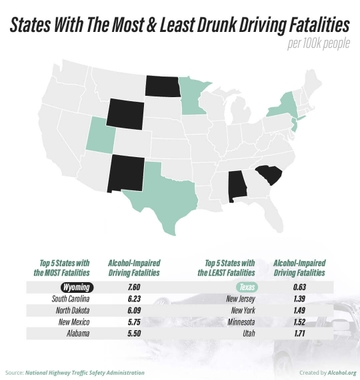It's no secret drunk driving is a problem in New Mexico. According to Alcohol.org in 2023, New Mexico ranks within the top 5 states in the country with the most drunken driving fatalities. So how do we fix it? While it wouldn't end drunk driving, University of New Mexico Economics Professor Brady Horn says a higher alcohol tax is a step in the right direction.
Horn, graduate student Ana Milan Hinostroza, and senior lecturer David Dixon started researching alcohol policy in the state several years ago through a Research and Public Service Projects (RPSP), a state initiative to address New Mexico issues. They researched everything from drinking age laws to liquor licenses. Lastly, they focused on alcohol taxes. New Mexico already has an excise tax on alcohol, however, through their research, they found an increase in alcohol taxes could reduce alcohol-related fatalities.
"An economist can point out the economic rationale for why we should have alcohol taxes. It's pretty simple: alcohol causes negative externalities," Horn said. "When there are markets with negative externalities, they produce too much of that good. An alcohol tax can nudge behavior where fewer people will drink alcohol. This will result in fewer negative externalities meaning less crime, domestic violence, and less drinking and driving."
Horn says this research started when New Mexico State Senator Antonio Maestas requested UNM's Department of Economics to research contemporary economic issues within the state. From there, the alcohol tax research was born and white papers were published in 2022 and 2023. Horn would later present this study to the New Mexico legislature in the fall of 2024 where he said there was mixed reaction to the concept.
"Everyone agrees we want to reduce the harms from alcohol, some people just don't think taxation is the way to do it," he said. "My role is to inform people and let them make their own decisions."

Horn says there are numerous ways to tax alcohol throughout the country, such as the Ad Valorem tax, a percentage of the price of a drink. New Mexico has the most common type of alcohol tax, an Excise Tax, which taxes per gallon of beer or liter of wine paid for by the companies that sell the alcohol. According to the New Mexico Taxation and Revenue Department, beer is 41 cents per gallon and wine is 45 cents per liter.
"We're taxing these companies, many of which are outside New Mexico, for the alcohol being sold here," Horn said. "However, the economic research is clear that if you tax a company, they will pass some or all of that tax onto consumers. Thus, just because we tax producers doesn't mean New Mexico consumers aren't paying any of that tax."
He says New Mexico's alcohol taxes are generally standard, maybe even a bit lower, than other taxes on items like Tobacco.
According to his research, the proposed 25-cent per-drink alcohol tax could reduce alcohol use by up to 1.77% and increase tax revenue by $132 million. In terms of fiscal and social impacts, the per-drink tax is no different from an equivalent increase in alcohol excise tax. Also found in the research, Horn says a hypothetical ten-cent per-gallon increase in beer excise taxes could reduce 2.84 alcohol-related traffic fatalities in New Mexico each year.
After studying alcohol taxes in different states, Horn says the research is clear and convincing that a higher excise tax on alcohol would reduce alcohol-related fatalities. However, Horn acknowledges that alcohol is a complex good with both benefits and costs. Thus, any policies must keep that in mind.
"The important reason that alcohol is different is that consumption affects others who did not drink alcohol through negative aspects such as drinking and driving, domestic violence, or crime. When this happens, economists characterize this as a form of market failure and recommend some market intervention," Horn said. "This is why it is particularly important from an economist perspective. It's not just individuals who consume alcohol that will have worse health outcomes, that's all within someone's decision, but it's hurting other people."
According to the New Mexico Department of Public Safety, alcohol is involved in 40 percent of all fatal traffic crashes in the state making alcohol-related traffic fatalities the single largest factor in this state's traffic deaths.
If you or your loved one suffers from Alcoholism or a Substance Use Disorder, there are plenty of resources throughout UNM for help:
- UNM Addiction Recovery Resources (drugs and alcohol)
- The Center on Alcohol, Substance use, And Addictions (CASAA)
- The 24/7 Poison Hotline can be reached at 1-800-222-1222
There are also other local and national resources such as Mothers Against Drunk Driving (MADD) and Alcoholics Anonymous (AA) for help.






